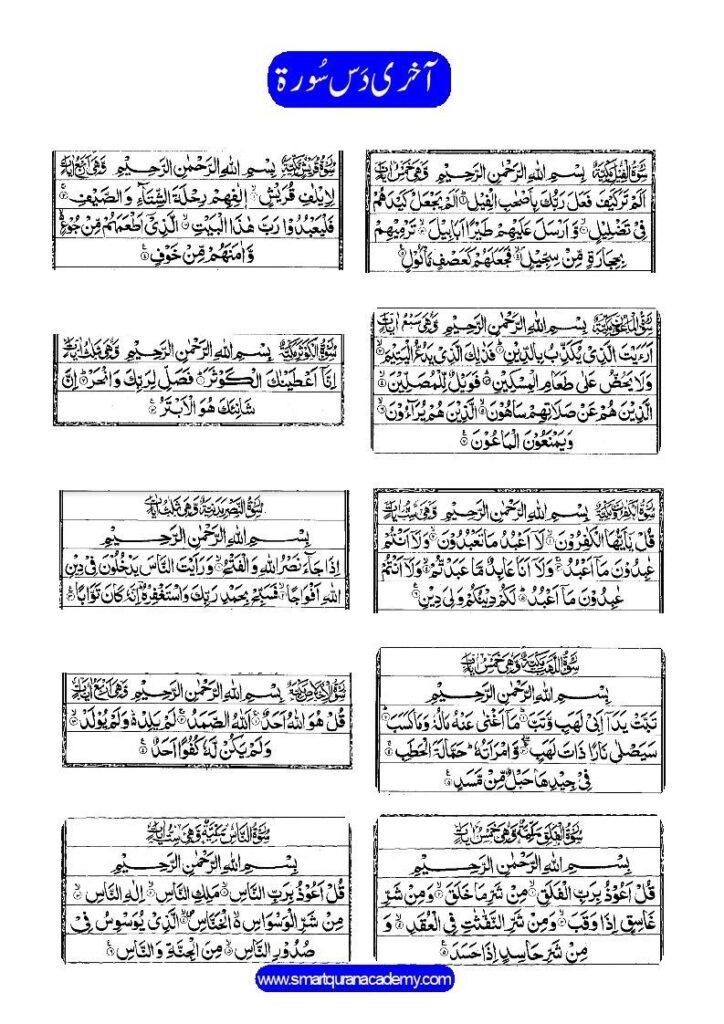Last Ten Surah of Quran
Introduction
The Quran is the holy book of Islam and is considered to be the direct word of God, as revealed to the Prophet Muhammad ( SAW ).The Quran is divided into 114 chapters, or Surahs, and each Surah has a unique title and message.
The last ten Surahs of the Quran are also considered to be particularly important in Islamic tradition because they contain several references to the concept of seeking refuge in God from evil, and they emphasize the importance of relying on God’s protection and guidance in all aspects of life. In this way, they serve as a reminder to Muslims of the central role that faith plays in their lives and the importance of turning to God in times of need.
Read Last Ten Surah of Quran

Watch Video for Last Ten Surah of Quran

Last Ten Surah of Quran in English
Here are the names and translations of the last ten Surahs of the Quran:
Surah Al-Fil (The Elephant): This Surah describes the story of the people of Yemen who attacked the Ka’bah with elephants but were destroyed by a flock of birds sent by Allah.
Surah Quraysh (Quraysh): This Surah highlights the blessings of Allah upon the tribe of Quraysh who were the custodians of the Ka’bah and were provided with safety and sustenance.
Surah Al-Ma’un (Small Kindnesses): This Surah emphasizes the importance of performing small acts of kindness towards others, such as providing food or clothing, as a means of showing gratitude towards Allah.
Surah Al-Kawthar (Abundance): This Surah assures the Prophet Muhammad of Allah’s support and promises him great abundance in both this life and the hereafter.
Surah Al-Kafirun (The Disbelievers): This Surah warns the disbelievers who refuse to accept Islam that their beliefs and practices will not be accepted by Allah.
Surah An-Nasr (The Help): This Surah describes the victory of Islam and encourages Muslims to seek forgiveness and turn to Allah in gratitude for His help.
Surah Al-Masad (The Palm Fiber): This Surah condemns the actions of Abu Lahab, the uncle of the Prophet Muhammad, who opposed Islam and persecuted Muslims.
Surah Al-Ikhlas (Sincerity): This Surah emphasizes the oneness of Allah and the importance of sincerely worshipping Him without associating any partners with Him.
Surah Al-Falaq (The Dawn): This Surah seeks Allah’s protection from the evils of darkness and the mischief of those who practice sorcery.
Surah An-Nas (The People): This Surah seeks Allah’s protection from the evil whispers of Satan and the corrupt intentions of those who seek to harm others. It also emphasizes the importance of seeking refuge in Allah in all aspects of life.
Conclusions
The last ten Surahs of the Quran are considered to be particularly significant for Muslims due to their short length, ease of memorization, and emphasis on seeking protection and guidance from Allah. They are often recited during daily prayers, before going to bed at night, and during other important occasions.
Each of the Surahs has its own unique message, ranging from reminders of Allah’s blessings to warnings against disbelievers and evil. They serve as a reminder of the central role that faith plays in the lives of Muslims and the importance of seeking refuge in Allah from all forms of harm.
Overall, the last ten Surahs of the Quran are a powerful reminder of the importance of maintaining a strong connection with Allah and seeking His protection and guidance in all aspects of life. They offer comfort, guidance, and assurance to Muslims, helping them to navigate the challenges of life with faith and strength.
FAQ'S
Here are some frequently asked questions related to the last ten Surahs of the Quran:
Q: What is the significance of the last ten Surahs of the Quran?
The last ten Surahs are considered significant for their message of seeking protection and guidance from Allah. They are also short and easy to memorize, making them accessible to Muslims of all ages and backgrounds.
Q: Can the last ten Surahs be recited at any time?
Yes, the last ten Surahs can be recited at any time, but they are especially recommended during daily prayers, before going to bed at night, and during other important occasions.
Q: Are there any specific benefits to reciting the last ten Surahs?
Yes, the last ten Surahs are believed to offer protection to those who recite them and are often recited as a form of prayer or supplication. Muslims believe that reciting them with sincerity and faith can help ward off evil and provide spiritual and emotional comfort.
Q: Why do some Muslims recite the last ten Surahs repeatedly?
Some Muslims may recite the last ten Surahs repeatedly as a form of spiritual practice or to seek additional blessings and protection from Allah. It is a personal choice and not required in Islamic tradition.
Q: Are the last ten Surahs only for Muslims?
Yes, the last ten Surahs are part of the Quran, which is considered to be a holy book for Muslims. However, the message of seeking protection and guidance from Allah is universal and can be applied by anyone, regardless of their faith or background.
Register Here
Three Days Free Quran Classes
Contact Details
+1 352 464 8059
+92 333 8182884
LearnQuranWeb1



